Feature Articles - The Most Popular War in History - Setting the Scene
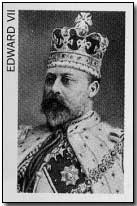
Britain c. 1890-1914 - Setting the Scene
The traditional view of Britain before 1914, possibly coloured by TV series like Upstairs, Downstairs, is of a golden age of British power, prosperity and social cohesion - in other words, the lower orders knew their place, and kept it, the pound was worth a pound and Britain was top nation. It is the image so wickedly satirised in Kind Hearts and Coronets (which to my knowledge has the additional distinction of being the only film about a serial killer to be issued with a 'U' certificate!).
Let us look at each of these three assertions in turn (before finishing with the Irish problem).
The Pound was Worth a Pound
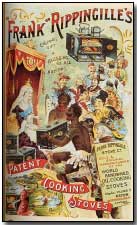 The
British economy was still the world leader. The City of London (which
incidentally features strongly in Kind Hearts...) was the world's
leading financial centre, sitting as it did at the hub of world-wide
investments totalling (in the money of the time), perhaps four thousand
million pounds. Investments included not only the extensive British
Empire but also large amounts in, for instance, the South American railway
system.
The
British economy was still the world leader. The City of London (which
incidentally features strongly in Kind Hearts...) was the world's
leading financial centre, sitting as it did at the hub of world-wide
investments totalling (in the money of the time), perhaps four thousand
million pounds. Investments included not only the extensive British
Empire but also large amounts in, for instance, the South American railway
system.
Furthermore, Britain had been the first country to begin serious industrialisation, way back in the 1780's, thereby stealing an unprecedented march on everyone else.
However by 1914 there seem to have been clear signs of resting on laurels. Very new industries, for instance the manufacture of electrical equipment, had been taken up largely by Germany (the Siemens organisation) and the Americans (Westinghouse and others). Britain was even falling behind in more traditional industries such as steel-making. As early as the 1890's this country was overtaken in this by both the Americans and by the German Empire which had only been in existence since 1870.
This is despite the fact that British science had laid the theoretical foundations of 'electro-technics' (Hobsbawm's word), and British ingenuity had solved a number of the more intractable technical problems associated with steel manufacture. The British economy was still pre-eminent, but other countries were catching up fast, or even overtaking. In the case of Germany, this added to the anxiety caused by Wilhelm II's more belligerent military noises.
Britain was Still Top Nation
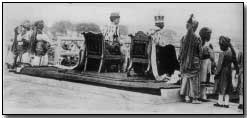 As
well as the powerful economy just referred to, the British had an enormous
world-wide Empire, covering nearly 1/4 of the world's land area which in
turn was efficiently patrolled by the world's largest navy and small
detachments of troops. Even where the British did not rule directly, their
commercial interests still made them an important presence, for instance in
South America.
As
well as the powerful economy just referred to, the British had an enormous
world-wide Empire, covering nearly 1/4 of the world's land area which in
turn was efficiently patrolled by the world's largest navy and small
detachments of troops. Even where the British did not rule directly, their
commercial interests still made them an important presence, for instance in
South America.
However this impression of overwhelming power was not all it seemed. My father was fond of pointing out at the dinner-table and elsewhere that much of the British Empire was ruled by bluff. India (the modern India proper, Pakistan and Bangladesh), the 'jewel in the crown' with 300,000,000 inhabitants, was run by 1100 (yes, just eleven hundred) high-calibre Indian Civil Servants and perhaps 800-1,000 other officials supported by 75,000 British troops.
In addition about 60% of the land area of India was the domain of the semi-autonomous Princely States where a few British officials resident at or near the rajah's palace kept an eye on things, British officers oversaw the armed forces but otherwise they were left to their own devices.
Perhaps the nearest analogy from the point of view of this website would be the 'Hungary' part of Austria-Hungary where the two blocs had a common monarch, foreign policy and defence but in other ways functioned as separate entities. As masters of bluff the British had good reason to be pleased with themselves, but it made for a precarious rather than substantial superiority especially when the bluff was called by Japan in 1941. Contrast this for instance with the present USA whose global dominance is supported by a massive home base (continent-wide rather than two small off-shore islands).
The Lower Orders Knew Their Place, and Kept It
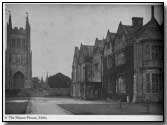 At
this time society was a great deal more sharply stratified than at present. The aristocracy and gentry were still powerful both nationally and locally,
and their code of conduct carried an enormous prestige which would be
inconceivable now. Their ideal was the 'gentleman', who was not,
necessarily, 'gentle'.
At
this time society was a great deal more sharply stratified than at present. The aristocracy and gentry were still powerful both nationally and locally,
and their code of conduct carried an enormous prestige which would be
inconceivable now. Their ideal was the 'gentleman', who was not,
necessarily, 'gentle'.
Rather, it was a shorthand for a morality with heavy military overtones including a romanticised attachment to death in battle as one of life's ultimate achievements (of which more later). Attachment to the status quo was still strong. Robert Roberts in The Classic Slum (p101) states that (in Salford), 'the city and borough held close on a million people, for the most part solid in allegiance to society as it was, and these had no time at all for "foreign workers or discontented labourers"'.
However the same source refers to 1.25 million working days lost through strike action in June 1911 when George V was crowned. This was part of a substantial change in the trade union movement described by Henry Pelling in A History of British Trade Unionism. Dr. Pelling describes a process in which the original craft unions, often exclusive and conservative in outlook, were supplemented and added to by much larger 'general' unions taking in poorer, less skilled and potentially more militant members.
By 1914 strikes in key industries had shown themselves capable of bringing the country to a standstill, and the unions were working themselves into the mainstream of political life largely through the foundation of the Independent Labour Party. It has been suggested by George Dangerfield that the country was close to Socialist revolution in both 1911 and perhaps 1914 (when a general strike was threatened for October).
However the impression I myself have through reading Dr Pelling's book is that most of the strikes were about wages and conditions rather than anything more political. There was a marked suspicion (picked up by Roberts above) of elaborate and abstract socialist political theories imported from the Continent (mostly France and Germany). However union power does seem to have been important in prodding the Government to introduce directly relevant legislation such as the eight-hour day for the miners and to provide for the setting up of conciliation and arbitration boards.
Tea on the country-house lawn, prepared by the cook and brought across by a suitably deferential maid, whilst a beguiling image, is only one part of social relations at this time, albeit an important one. Despite the armies of servants, the tendency for the social classes to live in well-insulated worlds of their own and the more traditional relationships on large country estates, the 'lower orders', so-called, were growing in confidence and the foundations for today's more equal society were being laid.
However sufficient of the more deferential, even feudal attitudes remained for the majority of the population to tend at least to look to the upper classes to lead in ways difficult to conceive in these days. Upper-class values, as mediated by the public school curriculum and ethos (see the next section, Hard Schools of Endurance) and other strands tended to emphasise self-sacrifice and duty. This (combined with more generalised patriotism and other ideas floating around at the time) would, when the crunch came, provide a powerful motive to enlist for military service, even though there was no tradition of a large standing army.
Ireland
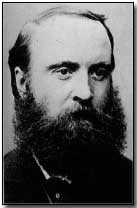 A persistent problem
for centuries, the Irish issue posed a serious threat to the unity of Great
Britain in 1914. As George Dangerfield points out, it was the first
time since the 'Glorious Revolution' of 1688 (when James II was forced to
abdicate) that the Government found itself unable to rely on the Army in a
matter of national security.
A persistent problem
for centuries, the Irish issue posed a serious threat to the unity of Great
Britain in 1914. As George Dangerfield points out, it was the first
time since the 'Glorious Revolution' of 1688 (when James II was forced to
abdicate) that the Government found itself unable to rely on the Army in a
matter of national security.
The problem goes back to Gladstone's first Home Rule Bill of 1886. This provided for a parliament in Dublin with the power to legislate on anything bar defence, foreign affairs, customs and coinage. It seems to have resembled the Austria-Hungary arrangement, and it is interesting to note from the point of view of preconceptions that the ultra-reactionary empire based in Vienna was able to negotiate a Home Rule agreement, whereas we could not.
The Liberal Party was split for all Gladstone's eloquence and the Act failed. Other attempts were made in 1893 (when the Bill failed to pass the Lords) and in 1912. By the third attempt the principal opposition was the Ulster Protestants who through historical links with the Conservative Party (then known as the Conservative and Unionist Party, incorporating the Ulster Protestants) were mounting an intense lobbying campaign backed by the threat of force.
By 1914 both Nationalists and Unionists were heavily armed, and the British Army (or at least enough of it to matter) was refusing to take action against the Unionists. It was probably only the outbreak of the European war in 1914 which prevented a civil war breaking out immediately. Even then there were still the Easter Rising (1916) and the very messy civil war resulting in the Irish Free State, to come.
Next - Schools of Endurance
Article and photographs contributed by Humphrey Reader.
A Daisy Cutter was a shell with an impact fuse to explode immediately upon touching the ground.
- Did you know?
